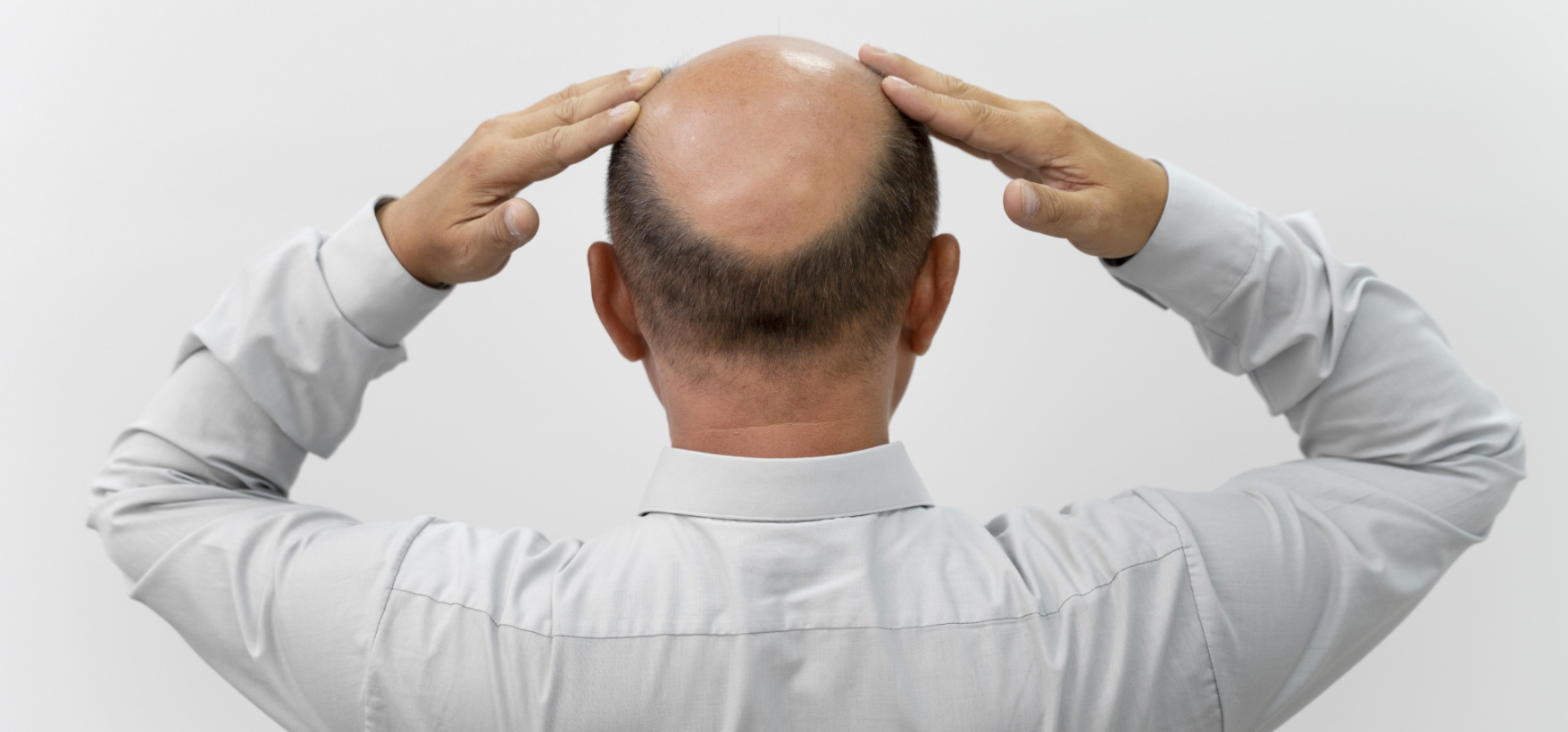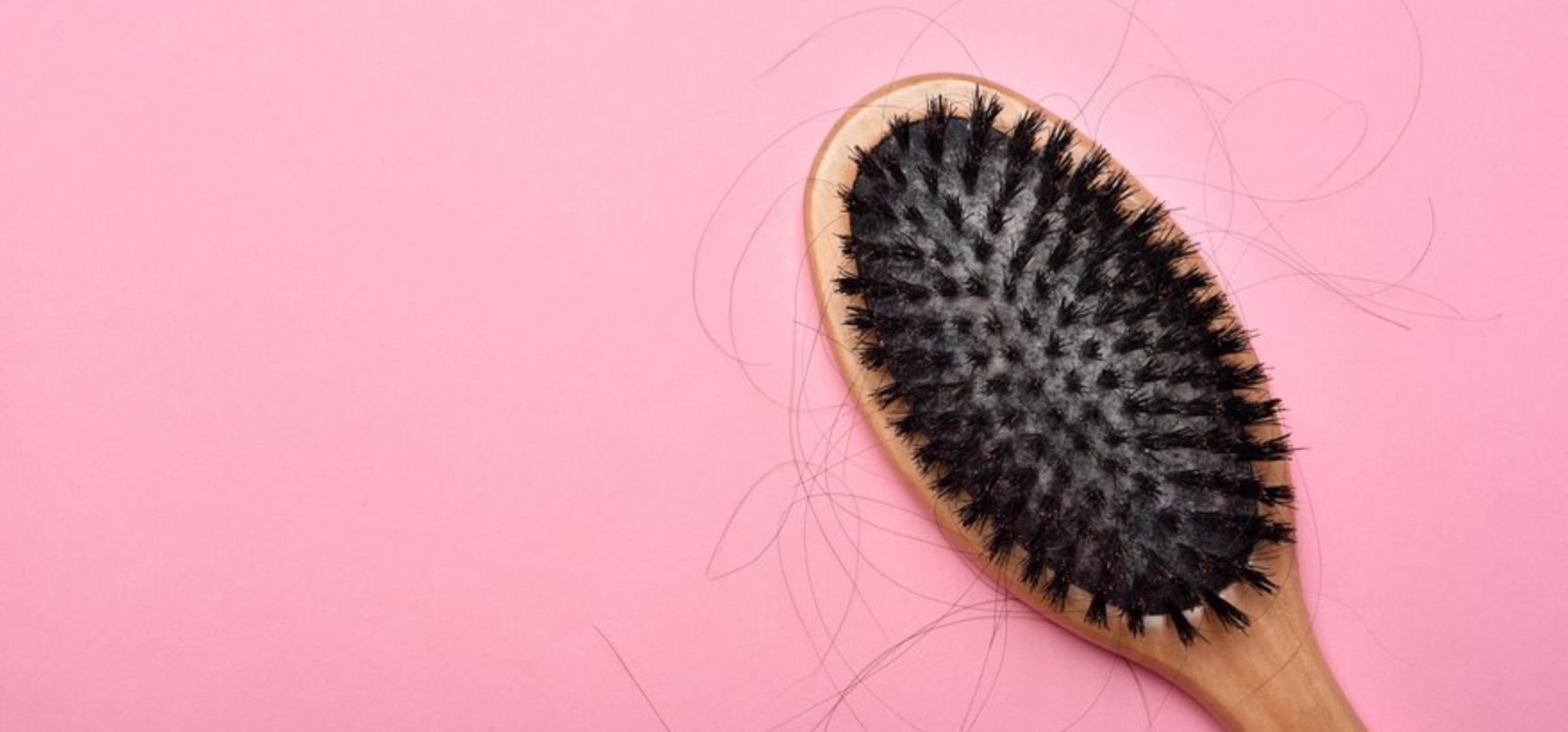Understanding Hair Fall
Hair fall is frustrating.
Hair fall is demoralising.
Hair fall adds stress to life. And oh, stress also adds hair fall to life. Vicious cycle, isn’t it?
While hair fall can scare people of all ages, the need for special care and attention to hair health is growing.
But before we do any of that, it’s important to understand why hair fall happens. Here are the most common reasons hair fall happens in men and women.
Causes of Hair Fall
Reasons for Hair Fall in Men
Most of the hair fall cases in men result from male pattern baldness.

The human male hormone, a.k.a testosterone, plays a significant role. When testosterone is secreted in excess, enzymes turn it into DHT.
DHT stands for Dihydrotestosterone, which is more powerful than testosterone. It enhances vitality and even helps build and maintain muscles. However, as the amount of DHT grows in the body, it may stick to the roots of the hair follicles blocking nutrition from reaching the roots.
As a result, hair follicles become weak, hair becomes thinner, and hair fall happens.
Apart from that, environmental factors such as water quality and air quality also influence hair loss.
Reasons for Hair Fall in Women

The problem of DHT blocking the hair follicles is extremely rare in women. Therefore, even in extreme cases, it may not lead to complete hair loss. However, your hairstyle choices, nutrition preferences, lifestyle, and environmental factors can cause hair fall and hair loss.
Health conditions such as anemia, and thyroid can also lead to poor hair health.
AR Ayurveda vaidya sala recommends the use of Draksharishtam for anemia. Varunadi kwath, which helps in weight management, is also useful in thyroid imbalances. These Ayurvedic medicines can help manage your health conditions and control hair fall.
The upcoming sections will discuss Ayurvedic treatments for hair fall. From nutrition to exercise, we’ll discuss everything. So stay tuned for healthy hair.
Impacts of Stress on Hair Fall
Many of us might have heard that stress leads to hair fall. But do we know how? And do we know how much? If yes, it’s good to be aware. If not, let’s get aware.
Stress and anxiety lead not only to hair fall. They increase it at a rapid pace. And the worst thing about stress and hair fall is how they link to each other.
Once you notice hair fall, you may become stressed. And when you take more stress, your hair fall condition may become more severe. Technically, stress and anxiety link to the following three conditions that trigger hair fall:
Telogen effluvium
Stress often pushes hair follicles to a resting phase. As a result, they do not produce new hair strands. As time passes, hair may become thinner and quickly fall out while brushing, bathing, or sleeping.
The primary reasons for this condition are stress and lack of nutrition.
Trichotillomania
This condition embodies the phrase “pulling your hair under stress.”
Yes, this is not an exaggeration. Many of us might have experienced this in real life. For example, when dealing with high stress, we may pull our hair tight. This psychological condition arises when people deal with extreme negative emotions.
Alopecia areata
This is the condition in which the immune system attacks hair follicles. Alopecia areata can cause hair thinning or bald spots. In addition, the hair can regrow over time and then fall back again in this condition.
There are no specific reasons this happens. However, genetics may still explain it to some extent.
While this doesn’t happen due to stress, this condition can trigger stress, leading to excessive hair fall.
How to Treat Imbalances in the Hair Doshas Through Ayurveda?
Imbalances in hair health are pretty common and occur for various reasons. In Ayurveda, these imbalances are regarded as symptoms of deeper health conditions.
According to Ayurveda, imbalances in the dosha levels can lead to many health concerns in humans. Since the hair is closely interlinked with the teeth, nails, and bone structure, any ill health in these body parts also manifests as hair damage.
Hair health is also closely affected by the nervous system and digestive health. This is where Ayurveda differs from conventional treatments. It focuses on providing proper nourishment and care to the body rather than superficially treating the hair alone.
Speaking of the three doshas and their effects on hair, the following pointers will give clarity.
Vata Dosha and Its Effects
Vata dosha can lead to dryness, frizziness, split ends, hair thinning, and hair loss.
Ayurvedic head oil massage (Shiro abhyanga) at least once or twice a week is important to nourish the scalp and hair. This can be a useful Ayurvedic treatment for frizzy hair.
AR Ayurveda vaidya sala Neelibringadi Keram is a complete nourishment oil with potent hair strengthening or Keshya herbs. You can also massage your hair with Kesini oil or coconut oil. This can help prevent split ends and keep dandruff and frizziness away.
Pitta Dosha and Its Effects
High Pitta can overheat the hair follicles, eventually leading to hair fall. Also, this causes hair premature greying, hair thinning, and baldness.
Solution?
To bring your Pitta to optimum levels, it’s advisable to keep your body and head cool. AR Ayurveda vaidya sala Neelibringadi Keram is a hair tonic oil to control hair fall and delay premature greying. You can practice yoga and meditation each day.
Kapha Dosha and Its Effects
Excessive Kapha can make your hair sticky, and extremely oily, which may also lead to wet and sticky flakes. It makes hair extremely heavy, greasy, and difficult to manage.
To manage this condition, it’s advisable to regularly wash your hair with a medicated and moderately mild shampoo. Apart from that, you can apply a Shirolepa hair pack. Here are the preparation steps:
- Soak fenugreek seeds (Methi) overnight in rice water.
- Grind in the morning, and apply the paste to your scalp.
Apart from that, you can also apply a paste of besan, coconut water, and lemon, or besan, Amla, Reetha, and Shikakai.
Also, note that Kapha hair is the most prone to dandruff. To manage this condition, it’s best to use a high-quality herbal cleanser that is safe and effective.
Ayurvedic Diet for Hair Growth

Wondering what Ayurvedic food for hair growth you can eat? This section covers that up.
As hair growth and hair health are directly linked to nutrition, it’s crucial to maintain a healthy, balanced diet. From essential hair vitamins to proteins, your diet should include all the vital nutrients.
Here’s a list of foods that can help reduce hair fall and promote hair growth.
- Moong beans
- Amla
- Cucumber
- Buttermilk
- Almonds
- Walnuts
- Peanuts
- Sesame seeds
- Cumin seeds
- Ghee
- Coconut
- Triphala
- Methi seeds
- Pomegranate
- Fennel seeds
Apart from these, you can add eggs and other sources of Vitamin B12 to your diet.
Ayurvedic Hair Treatment and Remedies
After discussing the causes of hair fall and foods that help avoid it, it’s time to discuss hair problems and solutions in Ayurveda.
- Regular scalp massage with Ayurvedic Oils (try weekends for starters).
- Cleansing scalp – don’t let your scalp remain dry for too long. A Shirolepa hair pack can help here.
- Dietary habits – incorporate foods that enhance hair growth in your diet.
- Sleep – stick to a 7-8 hour sleep regimen. AR Ayurveda vaidya sala Ksheerabala thailam is a relaxing foot massage (Padma abhyanga) oil that can provide relief from the concern of sleepless hours and uneasiness at night. This may also help optimize Vata levels in the body and make you feel calm.
- Stress management – take some time off, and take deep breaths during times of stress.
- Yoga practice – practicing specific yoga asanas daily can help you minimize hair fall. For example, Shirshasana and Sarvangasana help increase blood flow towards the head. This helps clear DHT layers and allows follicles to absorb nutrition.
Apart from that, you can also consider taking time out to meditate. Studies report that meditation can help control anxiety and overthinking over 60% of the time. As your stresses and anxieties become calm, your hair health may also improve.


